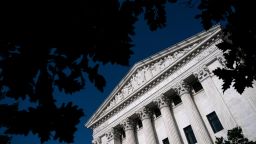(Tasos Katopodis/Getty Images/FILE)
For more than a decade, individual?Supreme Court?conservatives lamented lower court decisions that endorsed gun regulations, as their own court failed to expand a 2008 ruling that said the Second Amendment protects a right to a handgun in the home for self-defense.
One of the strongest dissenters was Justice?Clarence Thomas, who in 2020 declared, “It is extremely improbable that the Framers understood the Second Amendment to protect little more than carrying a gun from the bedroom to the kitchen.”
But the new conservative supermajority has changed everything for America, and on Thursday Thomas wrote the 6-3 decision broadening prior interpretations of the Second Amendment right “to keep and bear arms.”
Thomas wrote that the definition of “bear naturally encompasses public carry. Most gun owners do not wear a holstered pistol at their hip in their bedroom or while sitting at the dinner table. Although individuals often ‘keep’ firearms in their home, at the ready for self-defense, most do not ‘bear’ them in the home beyond moments of actual confrontation.”
This is the first time the justices declared a right to carry a weapon outside the home and, significantly for future cases, transformed the legal framework that most lower courts had adopted when reviewing gun laws.
Thursday’s ruling underscores the character of the contemporary court, which is often at odds with public opinion and in conflict with its predecessor courts, when centrist conservatives controlled the center and prevented the bench from pitching too far right.
Whether gun restrictions can stand, Thomas wrote, must be measured by the nation’s history, not by a state’s assertion of urgent public safety interests. He said the Second Amendment “requires courts to assess whether modern firearms regulations are consistent with the Second Amendment’s text and historical understanding.”
The decision striking down a New York licensing restriction is certain to open the door to more challenges to gun regulations, as the country confronts a new series of mass shootings, including at an elementary school in Uvalde, Texas, and?Congress is considering new firearms restrictions.
Led by senior liberal Justice Stephen Breyer, the dissenters referred to the 21 people dead from the Uvalde tragedy and the 10 who were killed a few days earlier in May at a Buffalo, New York, supermarket.
The dissenters insisted that Thomas’ new test goes further than what the court’s 2008 landmark demanded, and they observed at one point that “firearms in public present a number of dangers, ranging from mass shootings to road rage killings, and are responsible for many deaths and injuries in the United States.”
Justice Samuel Alito,?who like Thomas has been pushing for greater gun rights for years, joined the majority yet wrote a separate statement that dismissed Breyer’s list of mass shootings: “(H)ow does the dissent account for the fact that one of the mass shootings near the top of its list took place in Buffalo? The New York law at issue in this case obviously did not stop that perpetrator.”
Overall, Thursday’s ruling underscored the power dynamic on today’s 6-3 conservative-liberal bench. The appointment in 2020 of Justice?Amy Coney Barrett, who had complained as a federal appeals court judge that the Second Amendment appeared to be “a second-class right,” helped lock in Thursday’s decision.
The decision was signed by all three appointees of former president Donald Trump (Barrett, Neil Gorsuch and Brett Kavanaugh), along with Alito and Chief Justice John Roberts, both appointees of President George W. Bush.
Thomas, a 1991 appointee of President George H.W. Bush, is the longest serving member of the current bench. He turned 74 on Thursday.
The justices are in the final days of their current session, and among the awaited cases are those testing the future of abortion rights and a church-state clash involving a public school football coach who prayed after games at midfield. The conservative wing is likely to control those rulings, too.
Read more here.























